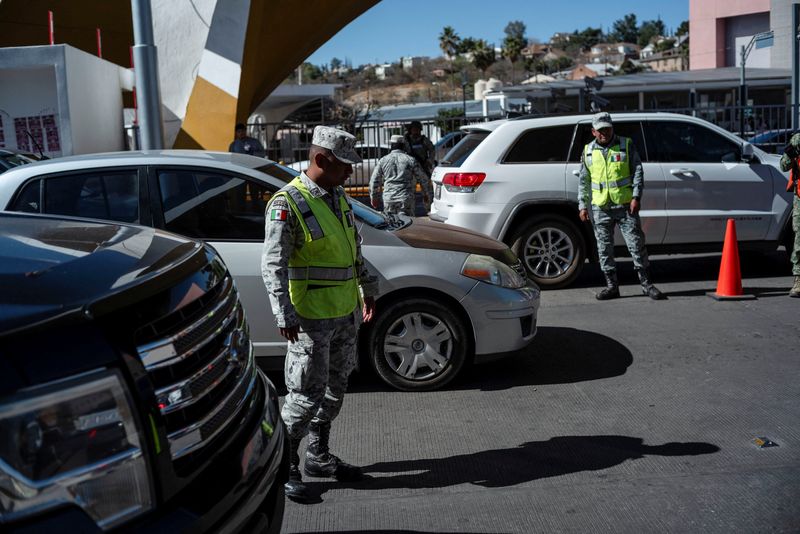Mexico, Canada seek to forestall Trump's tariffs with anti-drug efforts
By David Lawder
WASHINGTON (Reuters) - Canada and Mexico on Friday sought to show U.S. President Donald Trump’s administration evidence of progress in curbing the flow of fentanyl opioids into the U.S. ahead of a March 4 deadline for punishing 25% tariffs on their goods imports.
China, facing an extra U.S. import duty of 10% on Tuesday, accused the U.S. of "tariff pressure and blackmail" over fentanyl and warned that it would backfire.
Chinese foreign ministry spokesperson Lin Jian told a daily briefing in Beijing on Friday that Trump’s latest tariff threat, which comes on top of 10% U.S. duties on Chinese goods imposed on Feb. 4, "has created a serious impact, pressure, coercion and threat to the dialogue and cooperation between the two sides in the field of drug control."
In Washington, Mexican Economy Minister Marcelo Ebrard described a meeting with U.S. Commerce Secretary Howard Lutnick and U.S. Trade Representative Jamieson Greer as a "cordial working meeting" in a post on X. He added that the U.S. and Mexico "have a great future working together" but offered no details on discussions over the U.S. tariff deadline.
Trump on Thursday reaffirmed the deadline next Tuesday for imposing the duties on more than $900 billion worth of annual imports from Canada and Mexico, citing insufficient progress in reducing fentanyl overdose deaths in the U.S.
Mexico on Thursday staged its largest mass extradition of suspected drug cartel members in 10 years, including a 1980s kingpin who spent decades in prison for the murder of a U.S. drug enforcement agent and 28 other suspects.
Rafael Caro Quintero, 72, pleaded not guilty on Friday in federal court in New York on U.S. drug trafficking charges that could result in his execution. The other extradited suspects included younger leaders accused of moving fentanyl into the U.S.
Mexico’s Deputy Economy Minister Vidal Llerenas said on Thursday that Mexico could adopt other trade measures beyond the recent tariffs it imposed on certain imports to reduce low-value shipments from China.
The U.S. earlier this month moved to suspend the "de minimis" duty-free exemption for packages valued below $800 that has allowed fentanyl and its precursor chemicals to arrive unscreened through U.S. airports and border crossings.
But as packages piled up, the U.S. Customs and Border Protection agency paused the suspension until it could put effective screening measures in place.
ZELENSKIY DISTRACTION
On Friday, however, Trump and his top economic officials were also consumed with Ukrainian President Volodymyr Zelenskiy’s visit to the White House which erupted into a shouting match between the two president over the Russia-Ukraine war and Zelenskiy’s failure to sign a U.S. minerals agreement.
The Tuesday tariff deadline for China coincides with the start of its annual parliamentary meetings on Wednesday, a set-piece political event where Beijing is expected to unveil its main economic priorities for 2025.
Trump’s announcement leaves Beijing with less than a week to publish countermeasures, as the Trump administration shows signs of a hardening stance towards its strategic rival despite backing down on the threat of 60% tariffs when Trump took office on January 20.

"There are ongoing discussions with the Chinese, Mexico and Canada," a White House official told Reuters on Thursday. "We’ve gotten a good handle on the migration issue, but there are still concerns on the other issue of fentanyl deaths."
According to the Centers for Disease Control and Prevention, 72,776 people died from synthetic opioids in 2023 in the U.S., chiefly from fentanyl.
